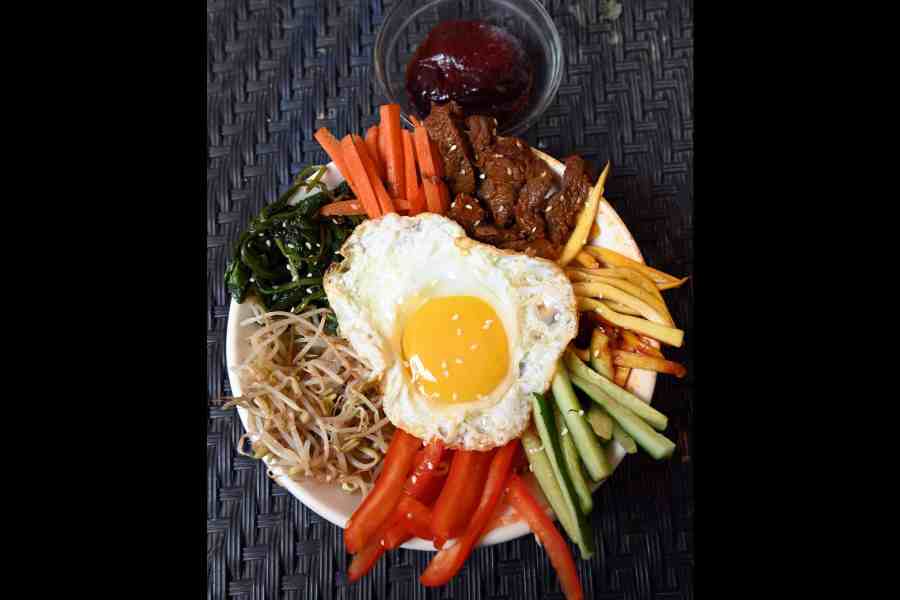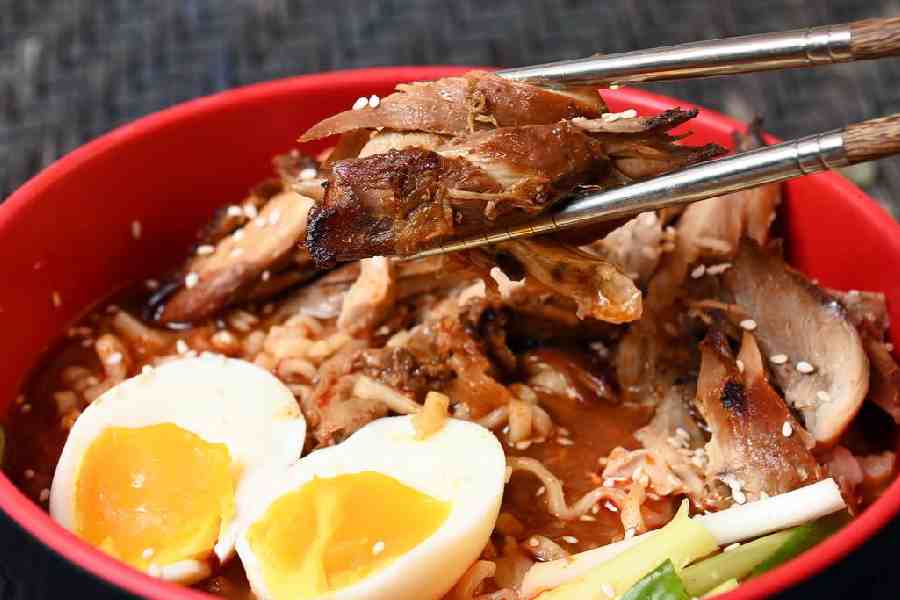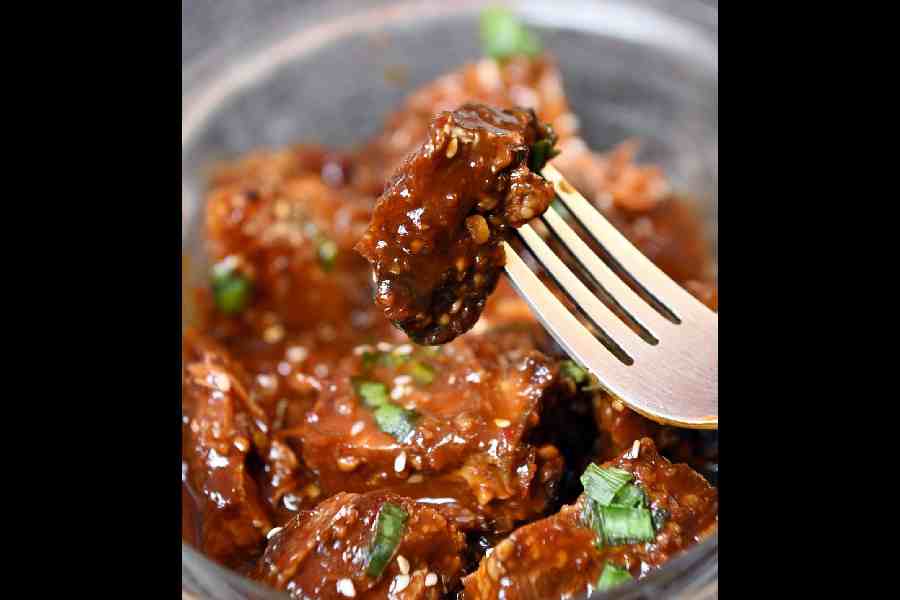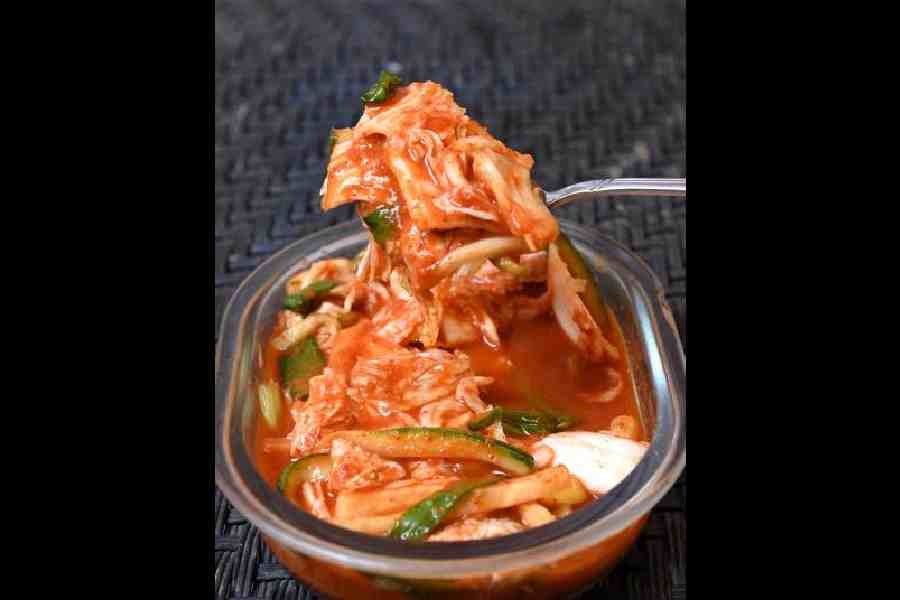Korean cuisine has evolved through centuries of social and political change. Originating from ancient agricultural and nomadic traditions in Korea and southern Manchuria, Korean cuisine reflects a complex interaction of the natural environment and the different cultural trends. Korean food is largely based on rice, vegetables, seafood and meats. Dairy is largely absent from the traditional Korean diet. The Korean meals have a number of side dishes that accompany steam-cooked short-grain rice. Kimchi is served at nearly every meal. Commonly used ingredients include sesame oil, soy sauce, garlic, ginger, gochujang (fermented red chilli paste), gochugaru (pepper flakes), doenjang (fermented bean paste) and napa cabbage along with lettuce leaves. Making of kimchi is listed on UNESCO Intangible Heritage list. Korean food, specifically their barbeque, has become extremely popular all over the world, along with K-pop and K-dramas.
KIMCHI
Kimchi is considered the national dish of Korea and is a staple in Korean cuisine. It is a traditional side dish of salted and fermented vegetables like Chinese cabbage, radish, spring onions, and so on. You can keep kimchi for days in the refrigerator in airtight glass bottles.
INGREDIENTS AND METHOD
1 Chinese cabbage cut into 3-inch pieces. Wash and brine it with salt. Keep aside for 1 hour to drain excess liquid. Then wash again under running water. Keep again to drain excess water and gently squeeze out excess water
5-6 stalks of green onions cut into 3-4 inch pieces
1 carrot cut into batons
1 big radish cut into batons
Now blend 150g onion, 4tbsp garlic, ½tbsp ginger, 1 pear, ¼ cup shrimp paste, ¼ cup fish sauce. Remove to a large bowl
Now add 2 cups of red pepper flakes (or according to taste)
¾ cup corn syrup or sugar syrup
In 1 cup water add ½ cup flour and mix well. Boil this mixture adding 1 more cup of water and keep stirring continuously till the mixture becomes thick and smooth but not lumpy. Keep aside to cool.
When cool add this mixture to the blended paste. Mix it well.
Add all the vegetables. Mix well. Check for seasoning and heat.
Keep aside in the refrigerator for some time before serving.
BIPIMBAP
Bipimbap is a filling and very nutritious dish found in restaurants, street markets and food courts. In one bowl you have rice, protein and vegetables. Vegetarians can use shiitake mushrooms instead of meat and also skip the egg. A total satisfying dish of goodness.

INGREDIENTS (For 4 persons)
For the bulgogi
500g of beef/chicken/pork cut into slices. Not too thin
3tbsp light soya sauce
1tbsp sesame oil
1 medium-size pear grated (important ingredient for tenderising)
5 cloves of garlic paste and 1tsp of minced ginger
3tbsp of brown sugar
Salt and pepper to taste
Marinate the beef/chicken/pork with all the above ingredients for at least one hour.
For sauteeing
3tbsp any neutral oil
1tbsp sesame oil
1tbsp light soya sauce
½tbsp sesame seeds
Vegetables required:
250g spinach blanched in hot water. Drain and squeeze out the water and chop roughly
1 carrot julienned
1 radish julienned
1 red capsicum julienned
Bean sprouts cooked in water for 10 minutes and drained
1 cucumber julienned
6 cloves of garlic
4 cups cooked short-grain rice
4 eggs (1 per person)
Gochujang paste according to taste.
METHOD
Heat a skillet with 2tbsp of neutral oil and 1tbsp of sesame oil. Then add soya sauce and sesame seeds and fry for a few seconds. Now remove 2/3 of the oil and keep aside for cooking the meat.
Now heat the remaining oil and add spinach. Add a little salt and sauté for a minute. Remove and keep aside.
Now in the same skillet fry the carrots and keep aside.
In the same skillet add radish
and fry for few seconds. Remove and keep aside.
Now in the same skillet add the remaining 2/3 oil that we kept aside and cook the meat till it becomes tender. Cook on high flame.
For the assembly
In individual bowls first put the hot cooked rice. Top it with a portion of the meat, spinach, carrots, cucumber, sprouts, and capsicum. Place a fried egg on top. Serve this with a teaspoon of gochujang.
The way to eat this dish is to mix everything and eat it.
NOTE: Vegetarians can make this with shiitake mushrooms. Soak the mushrooms for half an hour or so. Remove and slice it and follow the same recipe as for meat.
CHICKEN RAMEN SOUP
This Korean Ramen soup is a version of the traditional Korean Ramyeon. This soup has bold Korean flavours and Ramen noodles. Not the instant ones. Here I am making with chicken; you can use beef/pork or make it vegetarian with mushrooms too.

INGREDIENTS
4 chicken thigh with bone
1 onion sliced finely
1tbsp garlic sliced finely
1-inch ginger cut in big pieces. We will remove it later
4 cups chicken stock
2tbsp kimchi
4tsp gochujang
2tsp fish sauce
1tsp chilli flakes
Korean noodles about 150g (cook according to instructions)
Boiled eggs. The yolk should be slightly runny so do not overboil the eggs
Spring onions for garnishing
METHOD
Heat a big pot and add 1tbsp oil. Add the garlic and onions and sauté till onions are translucent.
Now add the kimchi, gochujang, fish sauce, and chilli flakes.
Add the chicken and sauté for a few seconds.
Then add the stock and cook the chicken till tender.
Remove the chicken and the ginger.
Grill the chicken with a brush of oil till slightly crisp on the outside. Then cut into chunks and keep aside.
For the assembly
In individual soup bowls first put the noodles.
Then add the soup (check for seasoning).
Then place the chicken on one side.
Cut the eggs in half and put next to the chicken.
Garnish with spring onions and serve hot.
PORK BELLY BULGOGI
Spicy pork bulgogi rice bowl is an easy and delicious meal made with Korea’s signature BBQ pork stir-fry and hot steamed rice. The BBQ pork is coated with addictively spicy sauce and is sure to please anyone who loves spice and pork.

INGREDIENTS
450g pork belly cut into big bite-size pieces
1 medium onion sliced
3 stalks of green onions chopped, white part for sauce and green for garnish
1tsp cooking oil
For the sauce
4 cloves of garlic minced
1tsp ginger minced
2tbsp gochujang
2tbsp soy sauce
2tbsp rice wine vinegar (or dry white wine)
½tbsp brown sugar
½tsp black pepper
1tbsp sesame oil
1tbsp Korean chilli flakes (or according to taste)
1tbsp white part of green onion
METHOD
In a bowl, combine all sauce ingredients. Mix well.
Heat a grill pan with 1tsp oil over medium to medium-high flame.
Place the meat in the pan. Cook till golden-brown on one side.
Now add the sliced onions and stir-fry till translucent.
Lower heat. Pour 2/3 of the sauce and thoroughly mix. Cook for 3 minutes.
Taste and see if you need any more sauce. Check for the doneness of the meat.
Garnish with green spring onions chopped and sesame seeds.
Enjoy with hot steamed rice.
You can also eat with lettuce leaves by making small parcels. A piece of pork, kimchi, cucumber, etc. Make a parcel and eat it.
KOREAN GREEN ONION AND SEAFOOD PANCAKE
This is an extremely popular dish in Korea. Different kinds of pancakes. It is the best street food. Very easy to make and also not many ingredients are needed. I am going to show you how to make green onion and prawn pancakes.
INGREDIENTS
For the batter
¾ tempura powder
¾ cup cold water
1 bundles of spring onions. About 10. Wash and dry completely. If too thick then slice vertically down
1 red chilli julienned
1 cup shrimps deveined and peeled
4tbsp cooking oil
1 egg
METHOD
Mix the tempura powder and water. No lumps should be there.
Take a big frying pan. Heat oil.
Now place the spring onions lengthwise. Fill the pan, but not till the edge of the pan, because then it will be difficult to flip later.
Pour the batter over the green onions evenly. Leave a little batter.
Let the batter settle down for a few seconds.
Make the flame medium. Place the shrimps.
Now pour the rest of the batter evenly. Let cook for a couple of minutes.
Now pour beaten egg over it. Place the red chillies.
Cook till the egg is set.
Just lift a little to see if the bottom is brown.
Carefully flip over with two flat spoons so as not to break the pancake.
Let it cook for a few more minutes.
Then flip it onto the plate. It should be crispy.
Cut in three parts lengthwise or into squares, as per your choice.
NOTE: You can make tempura batter from scratch by mixing the ingredients below.
1 cup all-purpose flour
¼tbsp black pepper
1/3tbsp salt or according to taste
1tsp garlic powder
1tsp onion powder
½tsp baking powder
1tsp cornstarch
¼tbsp sugar
GIMBAP
Gimbap is a Korean dish made from cooked rice, vegetables, fish or meat rolled in dry seaweed paper and served in bite-size slices. The dish is often part of a packed meal to be eaten at picnics and outdoor events, and can also be served as a light lunch along with yellow pickled radish and kimchi. It is a popular takeaway food in South Korea and is considered a convenient food because of its portability.
INGREDIENTS AND METHOD
The ingredients are of your choice. Only thing is that you have to cut them long and thin.
You can use bulgogi, chicken hot dog, shiitake mushrooms, egg omelette, pickled radish, sautéed spinach, cucumber, carrots, zucchini, and so on.
I have used shiitake mushrooms which I soaked in water and then when soft sliced it thin and sautéed in bulgogi sauce. Omelette sliced thin (vegetarians can skip this). Carrots and pickled radish sliced thin.
Cook short-grain rice. Add 2tsp sesame oil, a little salt and some sesame seeds. Mix well. Keep aside to cool.
To assemble:
Take a sushi mat. I have covered mine in plastic.
Place a seaweed sheet rough side up.
Now spread the rice over the sheet in a thin layer. Leave 1½ inch at the bottom.
Now place the bulgogi (chicken/ beef/ pork/ mushroom) in a thin layer.
Next to it place thinly-sliced radish, then carrots and egg omelette also thinly sliced. Do not overload. You have to place the ingredients right up to the edge of the mat.
Now start rolling. Lift your side of the mat and roll. Lift the end of the mat and roll again. See that it is a tight roll. (I have shown in detail with pictures how to roll sushi in Rocking the Rolls, t2 on Sunday, June 18, 2023)
Lift the mat. The roll should be even. Brush the roll with a little sesame oil to give a nice gloss.
Now cut the roll by dipping a knife in hot water. You have to cut in a see-saw fashion. Then the cut will be even.
From one roll you can have at least 8-9 pieces.
DIPPING SAUCE:
1tbsp soya sauce
1tbsp water
1tsp vinegar
1tsp yellow mustard
1tsp sugar
Mix all of the above well
Durri Bhalla is a cookery expert and author of Indian Bohra Cuisine and Inner Truth To Goo d Health And Weight Loss. You can find her @DurriBhallaKitchen on Instagram, Durri’s Kitchen on Facebook and Durri Bhalla on YouTube
